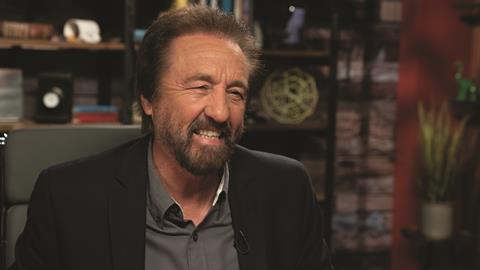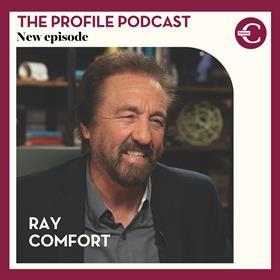The straight-talking evangelist whose conversations with strangers rack up millions of YouTube views is worried the Church is producing false converts. If you want to see people come to a lasting faith, stop starting with ‘Jesus loves you’, he says
Thirty years before the invention of YouTube, Ray Comfort was pioneering a style of videotape evangelism that would take the future internet by storm.
Accompanied by a small camera crew, the young Christian convert would walk city streets asking searching questions of strangers. Decades later, the VHS cassettes are long forgotten, but Comfort, 75, is still going strong – and he’s now watched by millions online.
The vox pop-style encounters he’s known for see the evangelist ask probing questions such as: “Have you ever looked at a woman with lust?”, “Have you lied or stolen?” and “Have you ever used God’s name in vain?” Such enquiries are carefully designed around the Ten Commandments to awaken a person’s conscience to their guilt, and understand their need for a saviour. According to Comfort, it’s only once the bad news (“you’re a sinner”) has been understood that Christ’s offer of salvation can be expounded. Fail to explain the bad news, and you end up with what he calls “false converts”.
You’ve got as much chance of sinners visiting a church building as you have criminals visiting a police station
In one recent YouTube video, Comfort asks an American university student if he’s had sex outside of marriage. Cue awkward glances away from camera. Comfort follows up with: “If God judges you by the Ten Commandments on judgement day, are you going to be innocent or guilty?” There’s only one possible answer to that question, as both parties well know. The inevitable answer – “guilty” – opens the door for Comfort to present Jesus as the student’s much-needed saviour.
Leading questions are Comfort’s forte. He unwittingly proves as much seconds before our interview officially begins, when he asks me: “So, should we pray, or do it in the flesh?” I, of course, acquiesce.
He speaks quickly, still in a thick New Zealand accent despite living in California for the past 35 years. His analogies are memorably cartoonish, and he has a healthy sense of humour. He tells me he was “born twice” in New Zealand (it took me a minute). And when his voice momentarily fails him towards the end of our 40 minutes, he apologises. “Excuse me. I got a tadpole on my throat trying to evolve into a frog. Let me kill it.”
Comfort’s life message is a challenge, perhaps especially to polite British sensibilities: if you’re squeamish about the reality of God’s judgement in your gospel presentation, you’re doing sinners “the ultimate disservice,” he claims. They need to know the truth. No sugarcoating.
His evangelistic method has been tried and tested, honed over decades. And while I’m still a firm believer that there’s no silver bullet when it comes to convincing sinners to repent, even I will admit that, a lot of the time, his strategy seems to work.
His 3,000+ videos are now lapped up by 1.6 million subscribers online and his Way of the Master TV show has been shown in more than 190 nations. Speaking of the impact his Living Waters ministry is having, he says: “We are overawed by what’s happening. The apostle Paul would be green with righteous envy to know that we could reach literally millions with the gospel with a click of a button.”
Those who have watched you on YouTube will know you have a very distinctive evangelistic technique, where you ask searching questions of strangers on the streets. Where did the idea come from?
When I became a Christian, the first thing I wanted to do was share the gift of everlasting life with all those I knew who were sitting in the shadow of death.
I began using a camera in about 1998 after I discovered a principle used by Spurgeon Wesley, Moody, Jesus and the apostle Paul that had been almost totally neglected by modern evangelistic methods.

What is that?
I discovered that between 80 and 90 per cent of those making a profession of faith in local churches and large crusades fell away from the faith. And I thought: Man, if you go fishing and you lose 90 per cent of the fish, you gotta check your nets! There’s something wrong.
I read a portion of a sermon by Charles Spurgeon, where he said: “What will you do when the Law…comes in terror; when the trumpet of the archangel shall tear you from your grave; when the eyes of God shall burn their way into your guilty soul; when the…books shall be opened and all your sin and shame shall be punished…can you stand against an angry Law in that Day?” And I thought: Man, that’s a little different from: “God loves you and has a wonderful plan for your life.” What is Spurgeon doing?
I began to study and I saw that Jesus did the same thing with the rich young ruler. When he asked Jesus how to inherit eternal life, Jesus didn’t say: “God loves you. There’s a God-shaped vacuum in your heart.” Jesus said: “You know the commandments.” Why did he do that? Well, Paul tells us, the law is a “schoolmaster” to bring us to Christ (Galatians 3:24, KJV).
Biblical evangelism is confronting sinners in love and in gentleness about their sins and then preaching the cross. It’s basically diagnosing the disease before you give the cure.
Saying “God loves you” isn’t wrong, then. But it can only happen once you’ve explained the context of judgement and sin. Is that correct?
Yeah, that’s well put. You do not give the love of God when you’re talking about sin. That’s like telling a criminal who’s committed rape and murder that the judge really likes him. That’d be a wrong thing to do. You want him to tremble at his transgression before you say: “The judge is going to show you mercy.”
Nowhere will you find in the book of Acts anyone saying: “God loves you.”
Why do you think so many well-meaning evangelists don’t start with repentance, wrath and judgement? They tend to say instead: “God loves you, come to him”, or: “Try Jesus.”
Well, I did the same thing. I just didn’t understand the biblical principles.
You know, I make sinners tremble. And there’s a reason for that. Fear is good if it’s used legitimately. If you’re going to jump out of a plane, the reason you put on a parachute is because you’re fearful of hitting the ground at 120 miles an hour. That fear is your friend, not your enemy. It’s doing you a favour and making you put on a parachute. The Bible says: “The fear of [the Lord] is the beginning of wisdom” (Proverbs 9:10), and so we should cause sinners to tremble in fear to a point when they say: “Wow, this is serious. What should I do?” And that‘s when we bring the glorious gospel.
Scripture tells us, through “the fear of the Lord men depart from evil” (Proverbs 16:6, KJV). As long as people don’t fear God, they will not depart from evil. And that’s why we have so many false converts within the Church – those that name the name of Christ and never depart from iniquity. In fact, if you read Spurgeon, Wesley, Whitefield and others who were used down through history by God, you’ll see they taught: “If you don’t use the moral law to proceed grace, you’ll fill the Church with false converts.” And that’s exactly what’s happened.
The Bible talks about God’s kindness leading people to repentance. When you say you don’t mind people shaking in fear, that doesn’t sound very kind.
Yeah, that’s Romans 2:4, where it says the “goodness of God” [KJV] leads us to repentance. But if you read that portion of scripture, it is sandwiched in wrath. In fact, some of the most wrath-filled parts of scripture are each side of [that verse]. So it doesn’t mean we talk about God being sweet, kind, loving and nice. No, God is to be feared.
Imagine you’re a doctor and you have in front of you a patient who’s dying. He looks incredibly well because he goes to the gym every day. He’s got a great physique. He thinks he’s very well, but you know he’s dying. You’ve got a cure in your pocket to give to this man for his cancerous disease. Do you give him the cure, or do you show him the X-rays?
Obviously, you don’t give him the cure. Why? Because he’s going to say: “Look at me. I’m healthy and well.” He’s going to find it foolishness and even offensive. But if instead you show him the X-rays, that man will see the poison seeping through his system and say: “Wow, doc, what should I do?” He’s ready for the cure because he’s seen the disease.
The disease is sin. The Ten Commandments are the X-rays. They show sinners that every time they lust, they’re committing adultery in God’s eyes and every time they lie, they’re heading for the lake of fire and storing up wrath that’s going to be revealed on the Day of Judgement.

Are you ever afraid of walking up to strangers and telling them these hard truths?
Fear of man has been like a Goliath for me for many years. I struggled with it, but I found something that took the fear of man from Goliath down to Zacchaeus in a matter of seconds.
When I meet a stranger, I say: “Do you think there’s life after death?” At this point, I haven’t mentioned hell, judgement day, sin – any of those things that are going to make him feel a little uncomfortable. I’ve just asked for his opinion. I’ve appealed to his ego. Most people say something like: “Oh, I don’t know.” I say: “Do you think about it?” and they say, “Yeah, all the time.” His “all the time” just dissipates my fears, because I realise he’s a human being with a sense of right and wrong and a will to live. God has written eternity upon his heart. So I appeal to that will to live. I’ll say something like: “Are you afraid of dying?” And most people say: “Yeah, a little bit.” And I’ll say [with incredulity]: “A little bit? Are you kidding? Someone’s going to put you in a box and bury you six feet under the ground. This is horrifying!” And they go: “Yeah.” And I can see in their eyes, they’re thinking: How does this guy know this? And I know it because Hebrews 2:15 says every human being is “haunted” by the fear of death all their lifetime (AMB). So I appeal to the will to live, and I do it by saying something like: “Do you ever read the Bible? Do you know it’s the world’s biggest-selling book of all time, and the reason it’s so popular is because God in the Old Testament promised he would destroy death, and in the New Testament, we’re told how he did it? Would you like me to tell you about it?” And almost everybody says: “Yes.”
The other thing is, right at this moment, there are literally millions of people in torture chambers called gyms lifting weights that are far too heavy for them. They’re agonising over it. Why? Because they want to extend their life. They want to be healthy, and they drink green slime to make sure they’re healthy. We haven’t found something that’s going to extend our life for a few years. We have found everlasting life in Jesus Christ. And my thought is, if the world knew what we had, they would ask us. That’s my confidence.
Think of a waitress in a restaurant. She sees three businessmen sitting at a table. They’re wheeling and dealing millions of dollars. Is she intimidated? No, she just walks up and says: “Can I take your order?” Why is she so bold? It’s because she knows she has what they want. They are there for food, and that’s what feeds her boldness, and that’s what should feed our boldness. We have what this world wants more than anything else – everlasting life.
I’ve noticed you talk about hell a lot, and you seem very sure about it. Are you certain that anyone who doesn’t accept Jesus will be consciously tormented in hell forever?
God’s judgement is according to righteousness. He’ll do that which is right. So when someone says: “Is God going to treat the little old lady who let out a cuss word the same as Jeffrey Dahmer who murdered and ate people?”, of course not. God’s judgement will be according to righteousness.
I take the words of Jesus to heart when he said: “Do not be afraid of those who kill the body and after that can do no more…Fear him who, after your body has been killed, has authority to throw you into hell” [Luke 12:4-5]. And that motivates me.
If hell didn’t exist, I’d be somewhere in Australia surfing – an old guy with long bleached hair, lying in the sand. But I can’t do that.
I’m surprised you need hell to motivate you. I know other believers who would say: “I didn’t become a Christian because of the threat of hell. I became a Christian because I’ve fallen in love with the person of Jesus.” But you’re saying if hell wasn’t real, you wouldn’t have become a Christian.
That’s right, because I realised I had sinned against God. And the tragedy is that the Church is filled with people who have no knowledge of sin and who never found a place of biblical repentance.
But do you accept that people come to Jesus for different reasons? And fear of hell may be a legitimate one, but it’s not the only route, is it?
But it should be. It’s ideal. We should be fleeing from “the wrath to come” [Matthew 3:7, KJV]. We should be trembling because we’ve sinned against God.
If you have committed adultery against your wife and you’re not really sorry, you just come back and say: “Honey, I know you’re going to take me back. I love you and you love me, and everything’s fine.” No, no, no. She wants him to weep. She wants him to be contrite and say: “I’ve done a terrible thing. Please forgive me.” That’s the door of salvation.
The Bible speaks of false conversions all the time – goats among the sheep, foolish virgins among the wise. The sign of a false convert is that he receives the word “with joy” and gladness [Luke 8:13, KJV]. There’s no sorrow for sin. That’s why we should look back and say: “Am I doing [evangelism] according to the Bible?” Because I’m doing sinners the ultimate disservice if I don’t preach as Jesus preached.
There have been reports in the past of people using tracts developed by your ministry in ways that have been heavily criticised and seen as inappropriate or aggressive. For example, giving an elderly person a card where they can write down the predicted date and time of their death, and advising them to contact an evangelist in order to avoid hell. Do you endorse that approach?
Yes and no. We produced that tract. Someone else gave them to elderly people, because elderly people are right by the door of death and are terrified of dying. They would embrace the gospel if they understood it. So while the media didn’t like it and portrayed it as being something heinous, it was actually motivated by someone who loved elderly people and was deeply concerned for them.
Surely you can see how scary that could be?
I’ll tell you what, on Saturday, I saw an elderly person coming towards me – a guy hobbling along in his late 80s or early 90s. I stopped him and challenged him, because I know this guy could be swallowed by death tonight, and I’ve got a moral obligation.
Biblical evangelism is diagnosing the disease before you give the cure
Now, secular news media seeing me doing that would say: “How dare you?” But God knows my heart. I said: “Sir, can I ask you a question? Do you ever read the Bible?” He said: “Yes, I do.” I said: “Are you trusting in Jesus?” “Yes, I am.” And if he hadn’t been, I would have said: “Can I go through the commandments with you to show how you need a saviour and how God wants to give you everlasting life?” I’ve seen elderly people say: “Yes, please tell me”, because no one’s bothered to tell them, because no one will love them enough.
If I were to adopt your position, I might argue the Church should stop bothering with worship band rehearsals, stop feeding the poor, stop doing any kind of pastoral care – those people are saved already. If your view is true, and millions of people are going to die and suffer in hell, then everyone should be on the streets 24/7. The Church should invest all of its effort in evangelism and do nothing else. If people are going to hell, what’s the point in doing the other stuff? Isn’t it just rearranging deckchairs on the Titanic?
That’s well put. And if you read the book of Acts, you’ll see the disciples were absolutely consumed. And I thank God the disciples didn’t stay in the upper room when everlasting life was granted. They didn’t carpet it out. They didn’t put in air-conditioning and piped music and put a little notice on the door: “Tonight, seven o’clock, all welcome.” They went open-air.
The Bible says there’s none that seeks after God [Romans 3:11]. You’ve got as much chance of sinners visiting a church building as you have criminals visiting a police station. We’ve got to go and do what Jesus said. He said: “Go into all the world and preach the gospel to every creature” [Mark 16:15, NKJV]. I believe in worship, and I obviously believe in good works. But if we reach out our hands to the lost, and just feed them, but don’t reach out with the gospel, what we’re doing is drawing near to God with our lips, but our hearts are far from him [Matthew 15:8]. We’re worshipping him in vain.
I love the words of Charles Spurgeon, the great prince of preachers. He said: “Have you no wish for others to be saved? Then you’re not saved yourself, be sure of that.” If pastors had an all-consuming zeal for the lost, they would reproduce after their own kind and their congregations would say: “Well, Pastor condescends to the lowly task of evangelism. I’m going to do the same.” And that’s when we’ll see this dying world reached with the gospel.
To hear the full interview listen to Premier Christian Radio at 8pm on Saturday 10 May or download ‘The Profile’ podcast








































1 Reader's comment